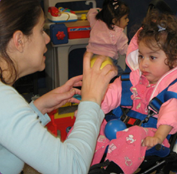 The resources and information found here are intended to help practitioners learn more about supporting young children with multiple disabilities and their families.
The resources and information found here are intended to help practitioners learn more about supporting young children with multiple disabilities and their families.
Multiple Disabilities
Available Resources
The Virginia Deafblind Project
Partnership for People with Disabilities at VCU
The Virginia Project for Children and Young Adults with Deaf-Blindness is committed to supporting families, early intervention providers, and service providers as they work to improve outcomes for infants and toddlers who experience both vision and hearing loss. For information about this project, visit the website using the link above or click here to review a flyer.
Assessing Communication and Learning in Young Children who are Deaf-Blind or who have Multiple Disabilities (external website)
Design to Learn Projects | Oregon Health and Science University
This 59-page booklet describes best practices for assessing communication and learning skills in young children (ages 2-8 years old) who are deafblind or who have additional impairments. Information is provided about planning for assessment, gathering information, and interpreting and applying results. Descriptive information about assessment tools that are appropriate for assessing young children with multiple disabilities is included.
Children Who Are Deaf-Blind (PDF)
National Consortium on Deaf- Blindness
This handout provides practice perspectives, statistics and information on supporting the development and education of children who experience deaf-blindness.
Severe/Multiple Disabilities (external website)
NICHCY Disability Fact Sheet No. 10 (Jan 2004)
This fact sheet covers a definition, incidence, characteristics, medical and educational implications, and resources related to children with multiple disabilities.
Learning to Communicate: Strategies for Developing Communication with Infants Whose Multiple Disabilities Include Visual Impairment and Hearing Loss (external website)
Deborah Chen, Ph.D | reSources, CA Deaf-Blind Services
This article provides lots of practical information and tips for working with families, recognizing communication cues, using key word signs with children with multiple disabilities. An annotated bibliography is also included with descriptions of print and video resources.
Webinars
C.A.T.S.: We're Here to Help Kids Move, Play, and Communicate
VA’s Integrated Training Collaborative | Partnership for People with Disabilities
Presented by Melissa "Missy' Rose, PT, DPT, C/NDT
This webinar highlights the importance of access to durable medical equipment for families in early intervention. The Children's Assistive Technology Service (C.A.T.S.), which is a free service that makes recycled equipment available to support movement, adaptive play, and communication, is described and the type of equipment that is available is showcased.
Senses & Census-ability
VA’s Integrated Training Collaborative | Partnership for People with Disabilities
Presented by Ira Padhye, M.Ed.
This archived webinar discussed characteristics and behaviors that will help early interventionists identify and support infants and toddlers who have vision and hearing loss. The presenter described the National Deaf-Blind Child Count and its importance as well as explain the how to complete the Census. She also shared information about Virginia's Project for Children and Young Adults with Deaf-Blindness. Click the link above to visit the 2016 Talks on Tuesdays Archive and scroll down until you find the webinar.
N/A
Liam's Story, A Mother's Voice
Jamie, Liam's mother, reads a letter she wrote to the VA General Assembly about how important early intervention has been in her family's life. In the video, you will meet Jamie and Liam and see how, through collaboration between his family and his early intervention providers, Liam is able to communicate, use a computer, and move about at home, on trips to a museum and out to get ice cream with his family.
Multiple Disabilities (external website)
Family Connect
This site offers information and links to resources related to family life, communication, learning, independent living skills, and future planning. Resources are available in English and Spanish.
National Center on Deaf-Blindness (external website)
This site’s Early Intervention page provides information relevant to supporting families, infants & toddlers who experience deaf-blindness.
National Organization for Rare Disorders (external website)
NORD offers information about rare diseases and disorders for families and medical professionals, information about advocacy, and a rare disorders database.